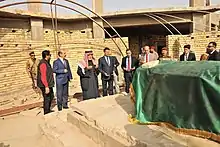Talhah
Talhah ibn Ubaydullah (Arabic: طلحة بن عبيدالله; 594-656) was a companion of the Islamic prophet Muhammad. In Sunni Islam, he is mostly known for being of the Ten Promised Paradise. He is best known for his roles in the Battle of Uhud and the Battle of the Camel, in which he died, according to Sunnis he was given the title "The Generous" by Muhammad.[1]
Talhah | |
|---|---|
 | |
| Blessed Companion, Jawad - the Generous | |
| Born | c. 594 C.E. Mecca, Arabia |
| Died | c. 657 C.E. Basra, Rashidun Caliphate now Iraq |
| Venerated in | Sunni Islam |
| Major shrine | Basra, Iraq |
| Influences | Muhammad |
Early life
Talhah was born c.594,[2]:171 the son of Ubaydallah ibn Uthman of the Taym clan of the Quraysh tribe in Mecca. His mother, al-Saaba bint Abdullah, was from the Hadram tribe.[2]:163
He is described as a dark-skinned man with a lot of wavy hair, a handsome face and a narrow nose. He liked to wear saffron-dyed clothes and musk. He walked swiftly and, when nervous, he would toy with his ring, which was of gold and set with a ruby.[2]:167–168
Talhah was a successful cloth-merchant who eventually left an estate estimated at 30 million dirhams.[2]:153,169–1670
Conversion to Islam
In 612 his kinsman Abu Bakr took him to visit Muhammad, and Talhah became a Muslim.[2]:164 He was said to have been one of the first eight converts.[3]:115
During the persecution of the Muslims in 614–616, Nawfal ibn Khuwaylid tied Talhah to Abu Bakr and left them roped together. Nobody from the Taym clan came to help.[2]:164 Thereafter they were known as "the Two Tied Together".[3]:127–128,337
Emigration to Medina
In September 622 Talhah was bringing a caravan home from Syria when he met Muhammad and Abu Bakr at al-Kharrar. They had escaped from Mecca and were emigrating to Medina. Talhah gave them some Syrian garments and mentioned that the Muslim community in Medina had said that their Prophet was slow to arrive. As Muhammad and Abu Bakr continued to Medina, Talhah returned to Mecca to put his affairs in order. Soon afterwards, he accompanied Abu Bakr's family to Medina, where he settled.[2]:164
At first he lodged with As'ad ibn Zurarah, but later Muhammad gave him a block of land on which he built his own house. He was made the brother in Islam of Sa'id ibn Zayd.[2]:165 Talhah and Sa'id missed fighting at the Battle of Badr because Muhammad sent them as scouts to locate Abu Sufyan's caravan. However, both were awarded shares of the plunder, as if they had been present.[2]:165
Talhah distinguished himself at the Battle of Uhud by keeping close to Muhammad while most of the Muslim army fled. He protected Muhammad's face from an arrow by taking the shot in his own hand, as a result of which two of his fingers were paralysed. He was also hit twice in the head, and it was said that he suffered a total of 75 wounds in the battle.[2]:165–166
Talhah also fought at the Battle of the Trench "and all the battles with Allah's Messenger".[2]:166
Ridda Wars
In the third week of July 632, Medina faced an imminent invasion by the apostate forces of Tulayha, a self-proclaimed prophet. Abu Bakr scraped together an army mainly from the Hashim clan (Muhammad's), appointing Talhah, Ali ibn Abi Talib and Zubayr ibn al-Awam as Commanders of one-third of the newly organised force each. However, they did not face any combat during the Ridda Wars.
Family
Talhah had at least fifteen children by at least eight different women.[2]:163–164[4]:298
- Hamna bint Jahsh of the Asad tribe, whom he married in 625.
- Muhammad al-Sajjad, who was also killed at the Battle of the Camel.
- Imran.
- Khawla bint al-Qaaqaa of the Tamim tribe.
- Musa.
- Umm Kulthum bint Abi Bakr.
- Zakariya.
- Yusuf, who died in childhood.
- Aisha.
- Suda bint Aqf of the Murra clan.
- Isa.
- Yahya.
- al-Jarba bint Qasama (Umm al-Harith) of the Tayy tribe.
- Umm Ishaq, married first to Hasan ibn Ali and later to his brother Husayn.
- Umm Aban bint Shayba ibn Abd Shams
- Ya'qub "the Generous", who was killed at the Battle of al-Harrah.
- Isma'il.
- Ishaq.
- A Concubine.
- al-Saaba.
- Another Concubine.
- Maryam.
- al-Faraa bint Ali, a war-captive from the Taghlib tribe.
- Salih.
Battle of the Camel and death

The Battle of the Camel was fought between Ali on one side and Aisha, Talhah and Zubayr on the other on 10 December 656. During the battle, Marwan ibn al-Hakam, who was fighting on the same side as Aisha, shot Talhah in the thigh. Marwan commented, "After this I will never again seek a killer of Uthman." Talhah hugged his horse and galloped off the battle-field. He lay down using a stone as a pillow, while the auxiliaries tried to staunch the blood-flow. Whenever they stopped pressing, the bleeding resumed. In the end Talhah said, "Stop it. This is an arrow sent by God." He died of this injury, aged 64.[2]:170–171
According to a hadith, Muhammad named Talhah among the Ten Promised Paradise (Arabic: العشرة المبشرون بالجنة; al-`Ashara al-Mubasharūn bi-l-Janna).[5]
Tomb
The tomb of Talha ibn Ubaydullah is located in Basra, Iraq. The tomb is located a large mosque with modern architecture. The grave itself is under the cenotaph under the dome, which is built in a similar style to the cenotaph of Anas Ibn Malik.
The mosque and tomb of Talha Ibn Ubaydullah was detonated by Shia Muslim militants disguised as photographers. The militants planted bombs in the shrine, destroying the mosque and tomb.[6] The tomb, which is under reconstruction, is still visited by Sunnis.
References
- سير أعلام النبلاء، لشمس الدين الذهبي، ترجمة طلحة بن عبيد الله، الجزء الأول، صـ 24: 40 Archived 18 December 2017 at the Wayback Machine
- Muhammad ibn Saad. Kitab al-Tabaqat al-Kabir vol. 3. Translated by Bewley, A. (2013. The Companions of Badr. London: Ta-Ha Publishers.
- Muhammad ibn Ishaq. Sirat Rasul Allah. Translated by Guillaume, A. (1955). The Life of Muhammad. Oxford: Oxford University Press.
- Muhammad ibn Saad. Kitab al-Tabaqat al-Kabir vol. 8. Translated by Bewley, A. (1995). The Women of Madina. London: Ta-Ha Publishers.
- Abu Dawud 41:4632.
